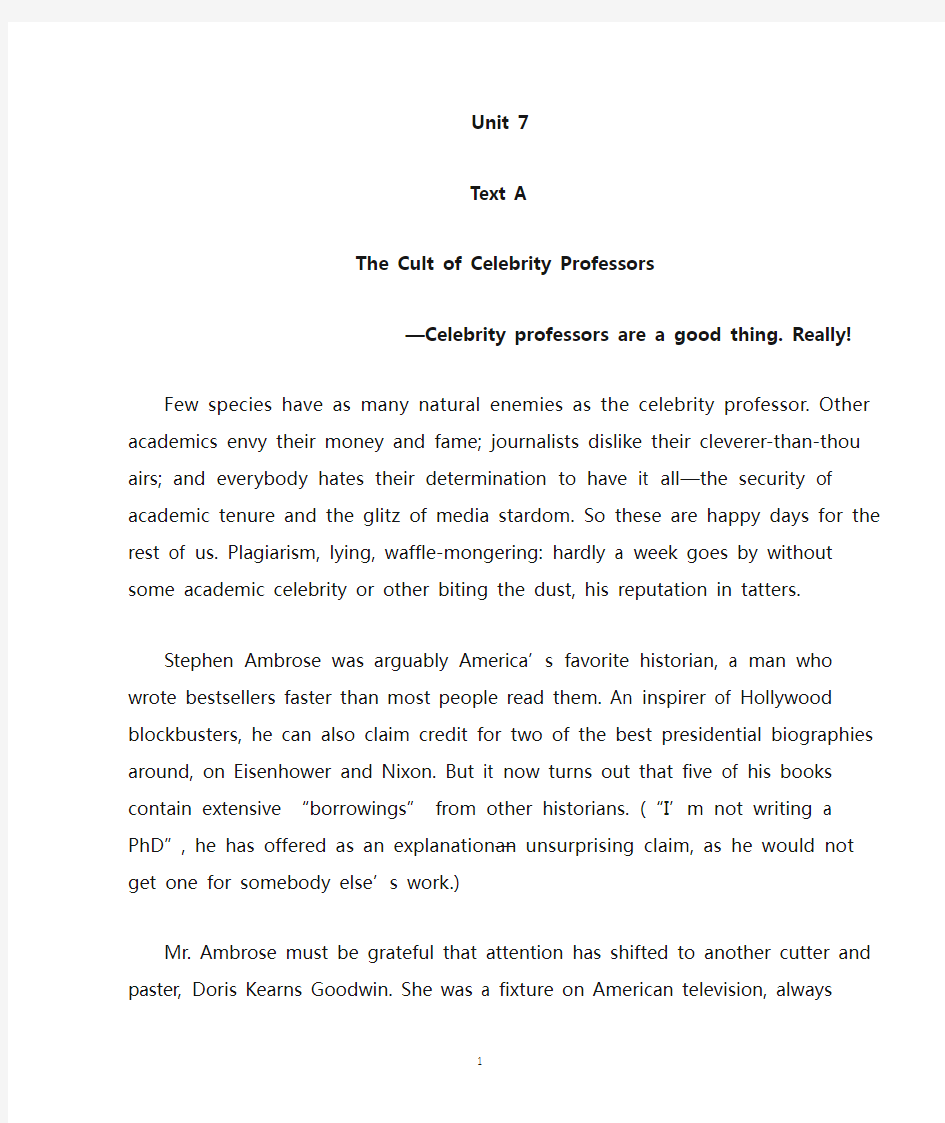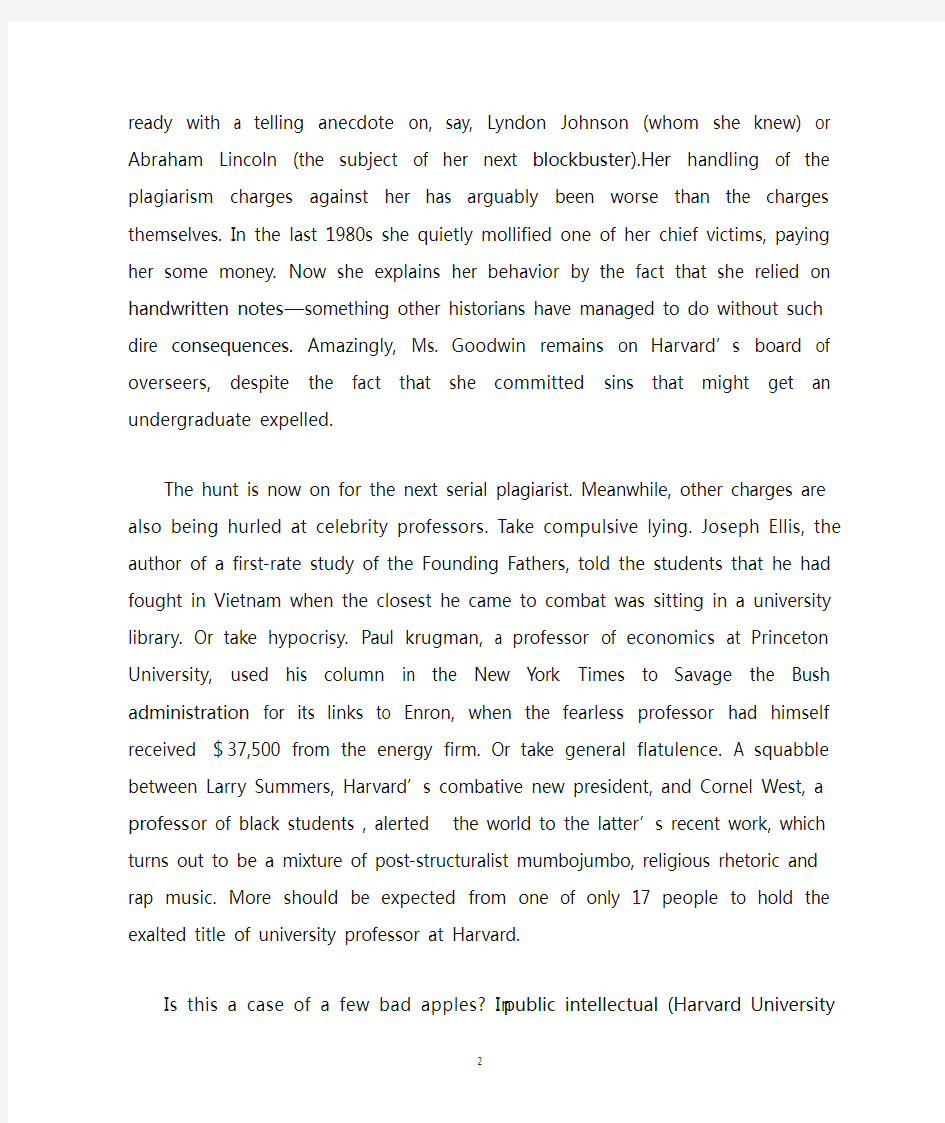The Cult of Celebrity Professors翻译


Unit 7
Text A
The Cult of Celebrity Professors
—Celebrity professors are a good thing. Really!
Few species have as many natural enemies as the celebrity professor. Other academics envy their money and fame; journalists dislike their cleverer-than-thou airs; and everybody hates their determination to have it all—the security of academic tenure and the glitz of media stardom. So these are happy days for the rest of us. Plagiarism, lying, waffle-mongering: hardly a week goes by without some academic celebrity or other biting the dust, his reputation in tatters.
Stephen Ambrose was arguably America’s favorite historian, a man who wrote bestsellers faster than most people read them. An inspirer of Hollywood blockbusters, he can also claim credit for two of the best presidential biographies around, on Eisenhower and Nixon. But it now turns out that five of his books contain extensive “borrowings” from other historians. (“I’m not writing a PhD”, he has offered as an explanation—an unsurprising claim, as he would not get one for somebody else’s work.)
Mr. Ambrose must be grateful that attention has shifted to another cutter and paster, Doris Kearns Goodwin. She was a fixture on American television, always ready with a telling anecdote on, say, Lyndon Johnson (whom she knew) or Abraham Lincoln (the subject of her next blockbuster).Her handling of the plagiarism charges against her has arguably been worse than the charges themselves. In the last 1980s she quietly mollified one of her chief victims, paying her some money. Now she explains her behavior by the fact that she relied on handwritten notes—something other historians have managed to do without such dire consequences. Amazingly, Ms. Goodwin remains on Harvard’s board of overseers, despite the fact that she committed sins that might get an undergraduate expelled.
The hunt is now on for the next serial plagiarist. Meanwhile, other charges are also being hurled at celebrity professors. T ake compulsive lying. Joseph Ellis, the author of a first-rate study of the Founding Fathers, told the students that he had fought in Vietnam when the closest he came to combat was sitting in a university library. Or take hypocrisy. Paul krugman, a professor of economics at Princeton University, used his column in the New York Times to Savage the Bush administration for its links to Enron, when the fearless professor had himself received $37,500 from the energy firm. Or take general flatulence. A squabble between Larry Summers, Harvard’s combative new president, and Cornel West, a profess or of black students , alerted the world to the latter’s recent work, which turns out to be a mixture of post-structuralist mumbojumbo, religious rhetoric and rap music. More should be expected from one of only 17 people to hold the exalted
title of university professor at Harvard.
Is this a case of a few bad apples? In public intellectual (Harvard University Press) Richard Posner, a federal judge, argues that it is the whole barrel. Although the book looks at all sorts of thinkers(not just whorish academics),Mr. Posner suggests that celebrity professors owe their influence to a fraud. They build their reputations tilling some minuscule academic field, and then pontificate on Charlie Rose about everything under the sun.
All true. Yet the judge, himself a leading intellectual for hire, is a little too harsh. Each celebrity professor may be a nauseous beast. Yet there are two big arguments in favor of what they do. Most obviously, they help to circulate ideas. They give educated laypeople a chance to get their information from real authorities rather than mere journalists. They give universities a chance to pay back some of their debt to the societies that nurture them. The fact that America’s bestseller lists feature works written by academic authorities amongst the ghost-written memoirs and celebrity suck-up jobs should be cause for rejoicing.
The second point is that they help to keep talented people in academia. Some noble souls will always be willing to put up with low salaries in exchange for a chance to pursue the truth :it is hard to imagine John Rawls hustling for a bit of extra cash. But others are inevitably attracted to money and bright lights. A bit of moonlighting is a relatively easy way for universities to keep some of their smarter faculty happy.
What about the costs of this moonlighting? Don’t academic superstars short-change their universities? Well, a bit. Yet the ostentatiously ludicrous Mr. West has undoubtedly helped to attract bright students to Harvard in the same way that those rather more serious once did. Surveys suggest that academics who engage in outside activities are actually more likely to do their share of teaching than those who don’t. Besides, the link between popular success and lower academic standards is not sharp. Mr. Ambro se and Ms. Goodwin both started “borrowing” other people’s work before they hit the big time.
Fundamentally, the besetting sin of American academia is not celebrity professors but hyper-specialization. Academics have a bit of crawling along the frontier of knowledge with a magnifying glass, blind to the wide vistas opening up before them, and often reducing the most engaging subjects to tedious debates about methodology. By looking at the big picture, populists restore the excitement of intellectual life. Who has done more for literary studies in the United States: Harold Bloom or the thousands of post-structuralists and their insufferable conferences? Who has more to advance the understanding of American business: Peter Drucker, who has never been employed by an Ivy League university, or the entire list of contributors to the Journal of Supply Chain Management?
And the market does work. The same media machine that turned Mr. Ambrose and Ms. Goodwin into superstars is now trashing their reputations. The honest majority of celebrity professors improve the world by spreading the fruits of academic research. The dishonest minority pay for their sins with the loss of their cherished reputations.
名家热
当名家是名利双收的好事,一点不假!
没有几个物种会像名家那样树敌众多。学者妒忌他们的名利双收。记者反感他们的盛气凌人。人人痛恨他们的志在必得,从学术地位的把持到媒体上的频频曝光,一个都不放过。所以对于我们外人来说倒是有热闹可看了。剽窃,说谎,招摇撞骗,几乎每周都能看到这个或那个专家名流身败名裂,一败涂地。
斯蒂芬·安布罗斯是美围非常得宠的历史学家。他创作畅销小说速度飞快,主上读者目不暇接。他不仅是好莱坞大片的创作源泉,更因写下艾森豪威尔和尼克松的最佳总统传记而广受赞誉。不料,现如今却曝出他的五部作品过度地“借鉴”了其它历史学家的专著。(对此他解释说“我又不是在写博士论丈”,那是自然喽,靠别人的作品是不可能获得博士学位的。)
现在安布罗斯想必可以略松口气了,因为舆论已将焦点对准另一位剪贴高手多丽斯·卡恩斯’古德温。她是美国电视节目的常客,对于诸如林顿·约翰逊或者亚伯拉罕.林肯等人的奇闻轶事总能侃侃而谈(前者与她熟识,而后者将是其下一部巨著的主角)。但她对剽窃指控的处理可能比指控本身更糟糕。上个世纪八十年代末,她用钱打发了一名被剽窃的作者让其保持沉默。如今在解释自己抄袭举动时,她申辩道当初不得不依赖手抄笔记,很多历史学家都亦如此,只是并未引起轩然大波而已。令人不解的是,本科生犯了同样的错误会被逐出校园,而古德温却仍是哈佛大学的校董会成员之一。
来看看另类的剽窃者吧。对名家的其他指控也轰然而至。罪名一,满口谎言。约瑟夫.艾利斯,创作的有关美国开国元勋的著作堪称一流。他曾对学生声称打过越战,然而实际上他“浴血奋战”的地方不过是学校的图书馆。罪名二,道貌岸然。保罗·克鲁格曼是普林斯顿大学的经济学教授,在纽约时报的专栏中猛烈抨击布什政府与安然公司相互结,这位“无畏”的教授却同时笑纳了能源公司的贿赂$37,500。罪名三,欺世盗名。咄咄逼人的哈佛校长劳伦斯·萨默斯和黑人问题研究专家康奈尔·韦斯特之间争论不休,使得人们注意到后者的最新研究成果不过是饶舌音乐、宗教辞汇以及后现代结构主义晦涩言语的大杂烩。作为十七位被冠以哈佛硕级教授中的一员,康奈尔·韦斯特带给我们的应该绝非如此。
这仅是几个害群之马而已吗?联邦法官里查德·波斯纳在其《公共知识分子》(哈佛大学出版社)中认为,这是整个学术风气的败坏。审视各类学者教授(不单是无良学者),波斯纳表
示学术权威的影响力源于对公众的蒙蔽。他们在某些狭隘的专业领域里打拼,一旦功成名就,便在“查利-罗斯访谈秀”等节目上煮酒论英雄。
话虽如此,同是受雇的知识精英,波斯纳未免有些偏激。名家也许是卑俗不堪的,但是至少还有两点说明他们的所作所为还是不无裨益的。首先,他们显然促进了思想的传播,使得受过教育的普通人有机会从真正的权威那里获取信息,而不仅仅是靠平庸记者的捕风捉影。他们也使大学得以回报社会对它们的滋养。由枪手代劳的自传和极尽谄媚之辞的作品遍地都是,而美国畅销书的排行榜更青睐名家们的专著。这一事实也足以让我们欣慰。
其次,他们有助于让学术界留住人才。伟大的人物甘愿忍受清贫来换取追求真理的机会。想想约翰‘罗尔素岂会为五斗米而折腰。当然凡人难免会为名利所动。一点外财就会让有才华的教师在大学驻足。
赚取外财的代价是什么?这些学术明星不会有负校方吗?也许会。跟其他一本正经的教授一样,韦斯特虽然善于做秀,毫无疑问也使不少聪慧的学生慕名进入哈佛。有调查表明.同那些没有社会活动的教授相比,经常抛头露面的学者能更好地履行职责。除此之外,声名鹊起和学术低下没有必然联系。在红极一时之前,安布罗斯和古德温都曾以借用他人作品起家。
从根本上说,美国学术界的症结并不在于名家个人而是研究视野酽浃隘化。学者们总是手持放大镜沿着研究前沿匍匐前行,而对前方的广阔天地熟视无睹,经常将最有价值的课题演变为方法论的无味争吵。平民知识分子们则能放宽视野,恢复举术生命的活力。谁对美国的文学更有贡献:是哈罗德·布鲁姆还是千万个后结构主义者以,。池们无聊的研讨?谁能更新美国的商业理念:是从未被任何名校聘用的管理学家彼得·德鲁克,还是《批量供应连锁店管理杂志》的无数投稿人?
市场是只无形的手。媒体曾将安布罗斯和古德温推向事业顶峰,如今却正让他们名声扫地。真正的名家积极传播学术研究成果以推动社会的发展,而那些欺诈之徒只会丧失他们最看重的名节,为自己的错误买单。
